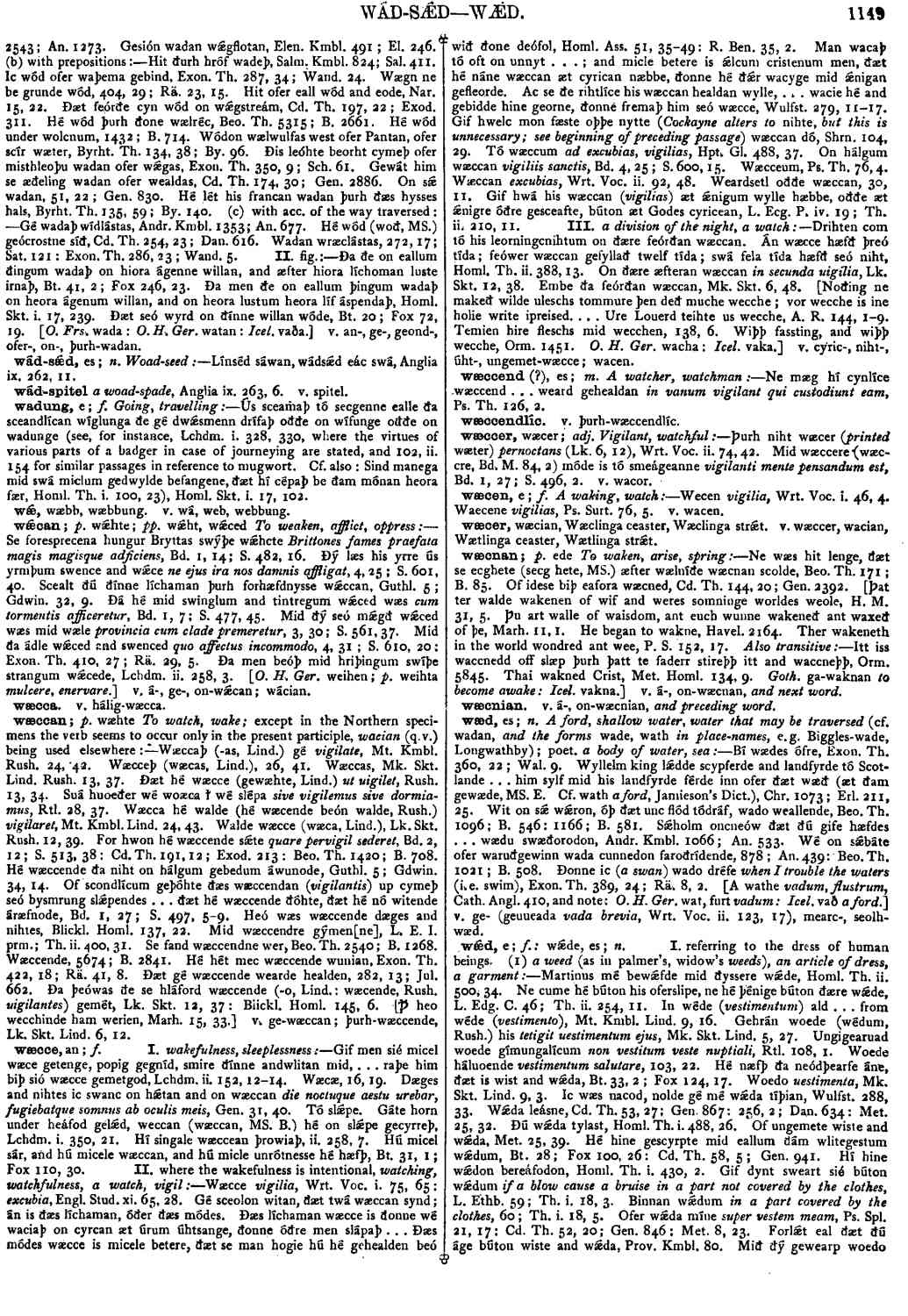wǽd
- noun [ feminineneuter ]
-
Martinus mé bewǽfde mid ðyssere wǽde,
- Homl. Th. ii. 500, 34.
-
Ne cume hé búton his oferslipe, ne hé þénige búton ðære wǽde,
- L. Edg. C. 46; Th. ii. 254, 11.
-
In wéde (
vestimentum) ald ... from wéde (vestimento ),
- Mt. Kmbl. Lind. 9, 16.
-
Gehrán woede (wédum, Rush.) his
tetigit uestimentum ejus,
- Mk. Skt. Lind. 5, 27.
-
Ungigearuad woede gímungalícum
non vestitum veste nuptiali,
- Rtl. 108, 1.
-
Woede háluoende
vestimentum salutare,
- 103, 22.
-
Hé næfþ ða neódþearfe áne, ðæt is wist and wǽda,
- Bt. 33, 2; Fox 124, 17.
-
Woedo
uestimenta,
- Mk. Skt. Lind. 9, 3.
-
Ic wæs nacod, nolde gé mé wǽda tíþian,
- Wulfst. 288, 33.
-
Wǽda leásne,
- Cd. Th. 53, 27; Gen. 867: 256, 2; Dan. 634: Met. 25, 32.
-
Ðú wǽda tylast,
- Homl. Th. i. 488, 26.
-
Of ungemete wiste and wǽda,
- Met. 25, 39.
-
Hé hine gescyrpte mid eallum ðám wlitegestum wǽdum,
- Bt. 28; Fox 100, 26: Cd. Th. 58, 5; Gen. 941.
-
Hí hine wǽdon bereáfodon,
- Homl. Th. i. 430, 2.
-
Gif dynt sweart sié búton wǽdum
if a blow cause a bruise in a part not covered by the clothes,
- L. Ethb. 59; Th. i. 18, 3.
-
Binnan wǽdum
in a part covered by the clothes,
- 60; Th. i. 18, 5.
-
Ofer wǽda míne
super vestem meam,
- Ps. Spl. 21, 17: Cd. Th. 52, 20; Gen. 846: Met. 8, 23.
-
Forlǽt eal ðæt ðú áge búton wiste and wǽda,
- Prov. Kmbl. 80.
-
Mið ðý gewearp woedo(giwédo, Rush.) his
proiecto uestimento suo,
- Mk. Skt. 10, 50.
-
Hé sette uoedo (giwédo, Rush.) his
ponit uestimenta sua,
- Jn. Skt. Lind. 13, 4: Mk. Skt. Lind. 11, 8.
-
Wit baru standaþ unwered wǽdo,
- Cd. Th. 50, 21; Gen. 812.
-
Sylle mon him wist and wǽdo,
- Exon. Th. 336, 12; Gn. Ex. 336.
-
Líchoma forðor is ðon wéde
corpus plus est quam vestimentum,
- Mt. Kmbl. Lind. 6, 25.
-
Ðæt gád ne wǽre wiste ne wǽde,
- Cd. Th. 222, 11; Dan. 103.
-
Ðæt gebyreþ tó wǽde and tó wiste ðám ðe Gode þeówian,
- L. Eth. vi. 51; Th. i. 328, 7.
-
Heó wæsceþ his warig hrægl and him syleþ wǽde níwe,
- Exon. Th. 339, 25; Gn. Ex. 99.
-
Wǽde mataxa (cf. strǽl vel bedding mataxa vel corductum vel
stramentum,
i.- 59, 29), Wrt. Voc. ii. 59, 28.
-
Wǽde antemne ( = sail ? rigging ? v. wǽde-ráp; and cf. Icel. váð
sail
(poet.)),- 100, 29.
-
Strengas gurron, wǽdo gewǽtte,
- Andr. Kmbl. 749: An. 375.
-
Se wælisca (hafoc) wǽdum and dǽdum his ǽtgiefan eáðmód weorþeþ,
- Exon. Th. 332, 25; Vy. 90.
- Wuldres treów wǽdum geworðode, Rood Kmbl. 29; Kr. 15.
Bosworth, Joseph. “wǽd.” In An Anglo-Saxon Dictionary Online, edited by Thomas Northcote Toller, Christ Sean, and Ondřej Tichy. Prague: Faculty of Arts, Charles University, 2014. https://bosworthtoller.com/34225.
Checked: 0